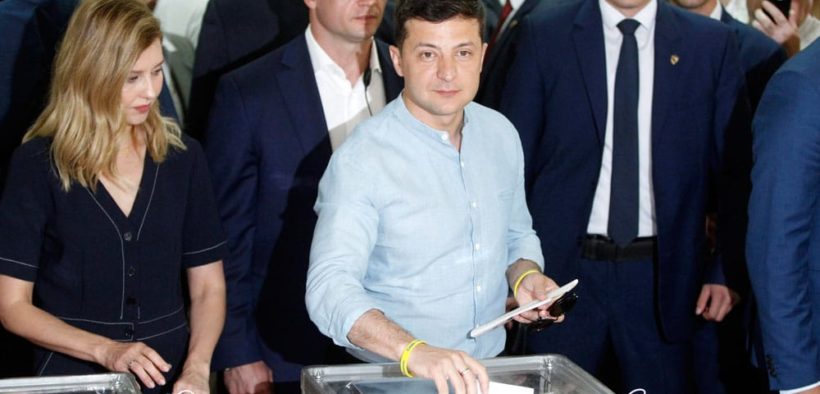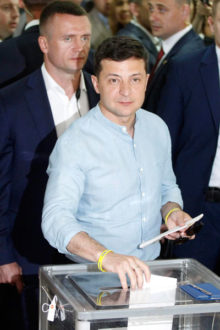What is Your Best Advice to the New President of Ukraine?

 Yuriy Romanenko
Yuriy Romanenko
Newly elected President Vladimir Zelensky was able to solidify his victory in the springtime presidential election with an overwhelming result in the recent summertime parliamentary elections. The presidential party ‘Servant of the People’ earned 253 seats in the Verkhovna Rada (parliament), which now makes it possible to pass laws without the need to create a majority coalition. In principle, this is the first time in the modern history of Ukraine where the president has found himself with such a (theoretical) concentration of power. And yet, in practice, Zelensky must still build an effective executive and legislative vertical – building on the mandate of confidence he has received from the public.
On what should Zelensky focus his efforts?
First, he must establish full control over the country’s security ‘bloc’ – something that would assure his ability to undertake an independent line of policy and behaviour. Indeed, it is the control of Ukraine’s oligarchs over the state security sector that continues to be one of the key obstacles to effective reforms in the country.
Second, having gained control over the security sector, Zelensky must demonstratively punish the most odious figures of the previous regime (or regimes). This could well include former Ukrainian president Petro Poroshenko. Punishment for corruption and blatant theft from the country is the only instrument that would allow Zelensky to safeguard his new legitimacy in the early stages of his presidency, given that any economic successes are far from guaranteed, and at best one to two years removed. As such, punishing the old elite would kill two birds with one stone: it would preserve the high support of the public and would make the ancien régime more compliant in accepting new rules of the game that would sharply decrease the role of corruption as a key substructure (and informal ‘institution’) in Ukrainian statehood and statecraft.
Zelensky must quickly concentrate power in the central organs of executive power and increase their effectiveness. On the other hand, he must rid the central organs of wasteful and superfluous control functions and mechanisms, pushing these down to the municipal levels.
Third, these new rules of the game should aim for de-oligarchization, de-monopolization and, to be sure, decriminalization of the political and economic system of Ukraine. In this context, Zelensky must master contradictory challenges in order that his actions have the right cumulative effect: on the one hand, he must quickly concentrate power in the central organs of executive power and increase their effectiveness; on the other hand, he must rid the central organs of wasteful and superfluous control functions and mechanisms, pushing these down to the municipal levels.
Fourth, Zelensky must undertake economic reforms that will be noticed by his electoral base – the middle class, which he must also enlarge. Poroshenko placed his bets on elite conspiracies, eventually lost legitimacy and, ultimately, lost power. Zelensky must instead focus on preserving and cultivating broad support in order to protect himself against conspiracies from the old elite (which is hungry, of course, for revenge). It follows that the new president should prioritize moves that Ukrainian society will interpret as being in defence of its interests – for instance, the simplification of the conduct of business, as well as stimulus for the development of national production that will lead to jobs. For this, Ukraine’s tax system must be further simplified, such that it becomes more profitable to pay taxes than take bribes. Bref, the foundation of Zelensky’s policies must be a pragmatism aimed at the widening of the resource base of his political regime on the strength of qualitative and quantitative growth in the economy.
Fifth, foreign policy under Zelensky must advance the goals discussed above – that is, it must be strictly pragmatic and aimed at concrete results through the provision of economic growth for the country. Related to this, evidently, the major problem of the Donbass must be resolved, as this war drains Ukraine daily of a huge quantum of resources. The Donbass question can be resolved either by means of an agreement with Russia through the mediation of the US, or by the taking of a strategic decision, by President Zelensky, to the effect that the Donbass conflict is fundamentally long-term in nature and that Ukraine will, as a consequence, henceforth focus not on the return of these conflicted territories, but rather on the organization and development of its own core territory. In this case, Ukraine should seek to broker an immediate and indefinite truce, and renew commercial arrangements with the Donetsk People’s Republic and Luhansk People’s Republic – instead of forcing their return, at all costs, to the Ukrainian constitutional and political fold.
Yuriy Romanenko is the Founder of the Ukrainian Institute for the Future in Kyiv.
Eduard Afonin
It would be perfectly reasonable for the new president to view the outcomes of the recent presidential and parliamentary elections as fundamental impulses and drivers for total transformation of the official state apparatus of Ukraine and democratization of the country’s governance. As such, President Zelensky would be wise to pay special attention to observing the ‘democratic formula’ proposed by the Polish-American political scientist Adam Przeworski to the effect that democracy is about procedural certainty in the context of uncertainty in outcomes. Of course, this is the exact opposite of the implicit formula applied in Ukrainian public life today, where certainty of outcome comes with procedural uncertainty.
Furthermore, the president should introduce latent (psychological) processes of change in the sizable bureaucracy of the country. For this, he may wish to use the observations and studies carried out since 2005 by the National Academy of Public Administration as well as the Institute for Economics and Forecasting in Ukraine’s National Academy of Sciences. In these studies, we developed and proposed algorithms for personnel selection and rotation in the civil service in such a way as to promote the advancement of ‘collectivists’ in place of ‘individualists’ – eventually fostering the development of a ‘social state’ in Ukraine and promoting a sharp decline in what we believe to be the psychological foundations of corruption in the country.
To be sure, the national expert community and the network of specialist institutes and think tanks across Ukraine on key problems of national and international development should also play a central role in the development of the president’s policy agenda.
Eduard Afonin is Professor of Public Policy in the National Academy of Public Administration under the President in Kyiv.
Irvin Studin
President Zelensky has two key priorities that he must ace if he is to succeed, and indeed if Ukraine is to survive as a sovereign state in its post-Soviet form.
First and foremost, he must broker a sustained peace in the Donbass in a way that meets three objectives – ending the bloodshed that has been the stain and shame of modern Europe; restoring the legitimacy of Kyiv over Donetsk and Luhansk; and, just as critically, restitching Ukraine’s relationship with Russia and, with this, Russia’s relationship with Europe, with Ukraine as an essential, respected and profitable (wealthy) ‘interstitial’ state between two of the world’s major strategic (and regulatory) blocs: the EU and the Eurasian Economic Union.
The essential first move in securing the peace in the Donbass and building the more general post-conflict settlement framework – nationally and internationally – is to introduce UN peacekeepers into the Donbass. The peacekeeper idea comes directly from our work at 21CQ and has been discussed many times in these pages. It has been supported, in various forms, by Russia, Ukraine, leading European countries and Canada. The peacekeepers must, in my judgement, come mostly from Asia – ideally, India, Indonesia or even Singapore – as Asia is highly respected in the former Soviet space and the aforementioned Asian states are strictly neutral as between NATO and the Eurasian bloc. Paradoxically, the racial juxtaposition of Asian peacekeepers with Slavic combattants would also serve as a clear signal that the conflict – at least in terms of the fighting dimension and the security dilemma plaguing the warring parties at the Minsk Process ceasefire line – is definitively over. The definitive end of the fighting by an outside impulse would also breathe new life into the by now very tired interaction among the key parties to the conflict.
President Zelensky must champion this peacekeeping proposal vis-à-vis Moscow and Washington, passing through Brussels, Paris and Berlin. And he must convince New Delhi – and failing New Delhi, then Jakarta or Singapore – to commit peacekeeping forces with speed. Bref, Zelensky must convince Asia that it can really save the world by saving Europe, effectively confirming the return of Asia to international strategic centrality. Europe would agree to this, but Zelensky must be dogged in getting Washington to understand and be sustainably interested.
Peacekeepers will require UN Security Council approval, and the only way for Ukraine and the West to convince Moscow not to veto a peacekeeping resolution is to make Moscow an offer that it cannot refuse.
Peacekeepers will require UN Security Council approval, and the only way for Ukraine and the West to convince Moscow not to veto a peacekeeping resolution is to make Moscow a deal it cannot refuse. Under the circumstances, this will be difficult, as Russia and Russians have by now grown used to the conflict, both materially and (especially) psychologically. Zelensky will therefore have to be relentless, directly with President Putin, in making the case that a more global deal, on top of the peacekeepers, will include the reversal of international sanctions related to the Donbass (and perhaps in other areas), non-NATO status for Ukraine, and Kyiv’s undertaking to develop a deep economic relationship with Russia and the Eurasian Economic Union, even as Ukraine pursues integration with Europe and Western institutions and structures.
Constitutional reform will doubtless be on the table, but that should be for Zelensky to decide independently of foreign preferences (Western or non-Western). In this regard, real federalism – something patently foreign to all post-Soviet countries, starting with Russia – should certainly be on the table, as should the consolidation in numbers of Ukraine’s multiple oblasts (provinces). There are too many.
Second, Zelensky must have the patience and seriousness to build a proper, highly professional civil service apparatus across Ukraine. This does not exist today at any appropriate standard, and every new revolution or regime in Kyiv has only served to purge or oust previous layers of professional bureaucrats and specialists in the official system. This is a tragedy of national policy and technical competence that can only be remedied through careful, systematic building, training and schooling. It will not happen within one presidential term, and the ‘talent’ of Ukraine’s youth and people is not enough of a substitute for professional vacuums. Bref, Zelensky, even as a political and policy neophyte, must set afoot a 20-year plan to develop Europe’s best civil service – from which, invariably, Ukraine will also find Europe’s best politicians and presidents.
Irvin Studin is Editor-in-Chief & Publisher of Global Brief.









